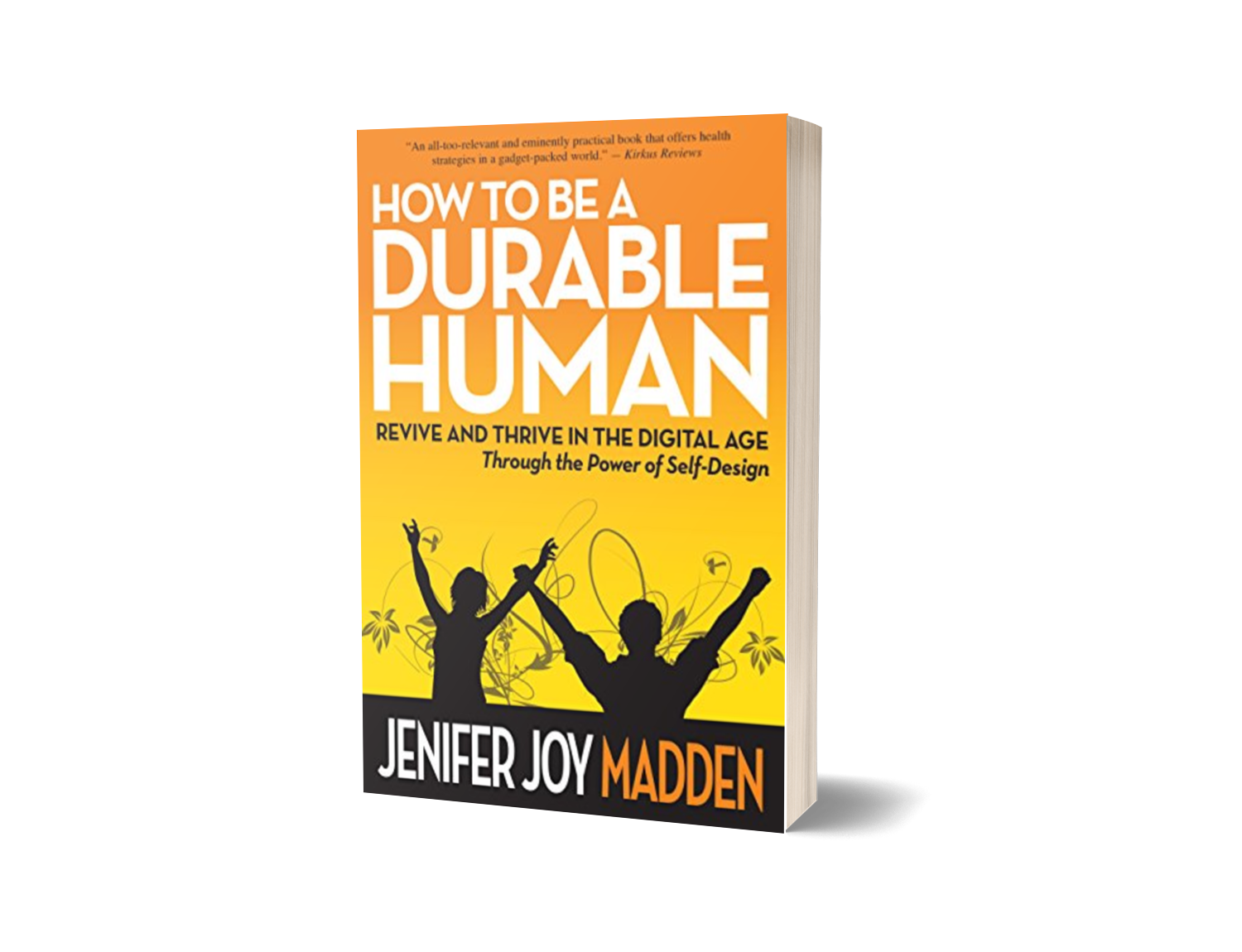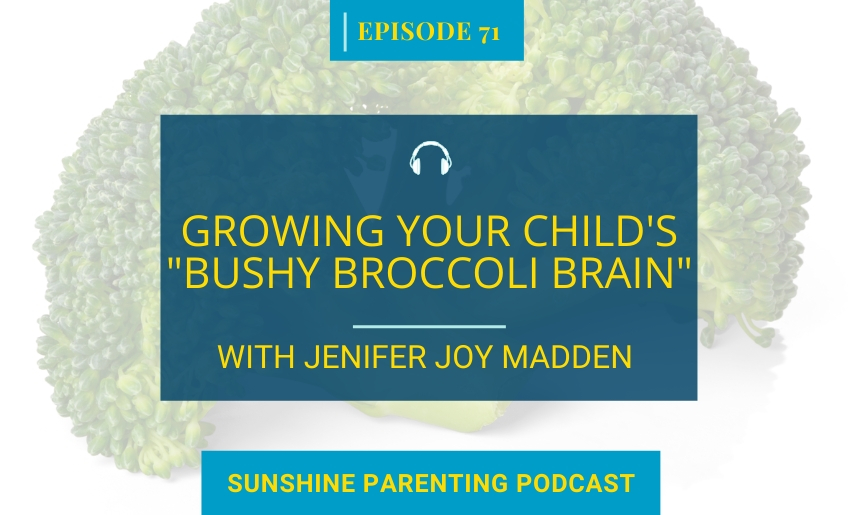
“The neuroscience is saying that when kids miss these developmental milestones, their brains aren’t as interconnected as they would have been had they been actively participating in a wide variety of activities. They need a full sensory upbringing, not doing too much of any one thing.”
-Jenifer Joy Madden
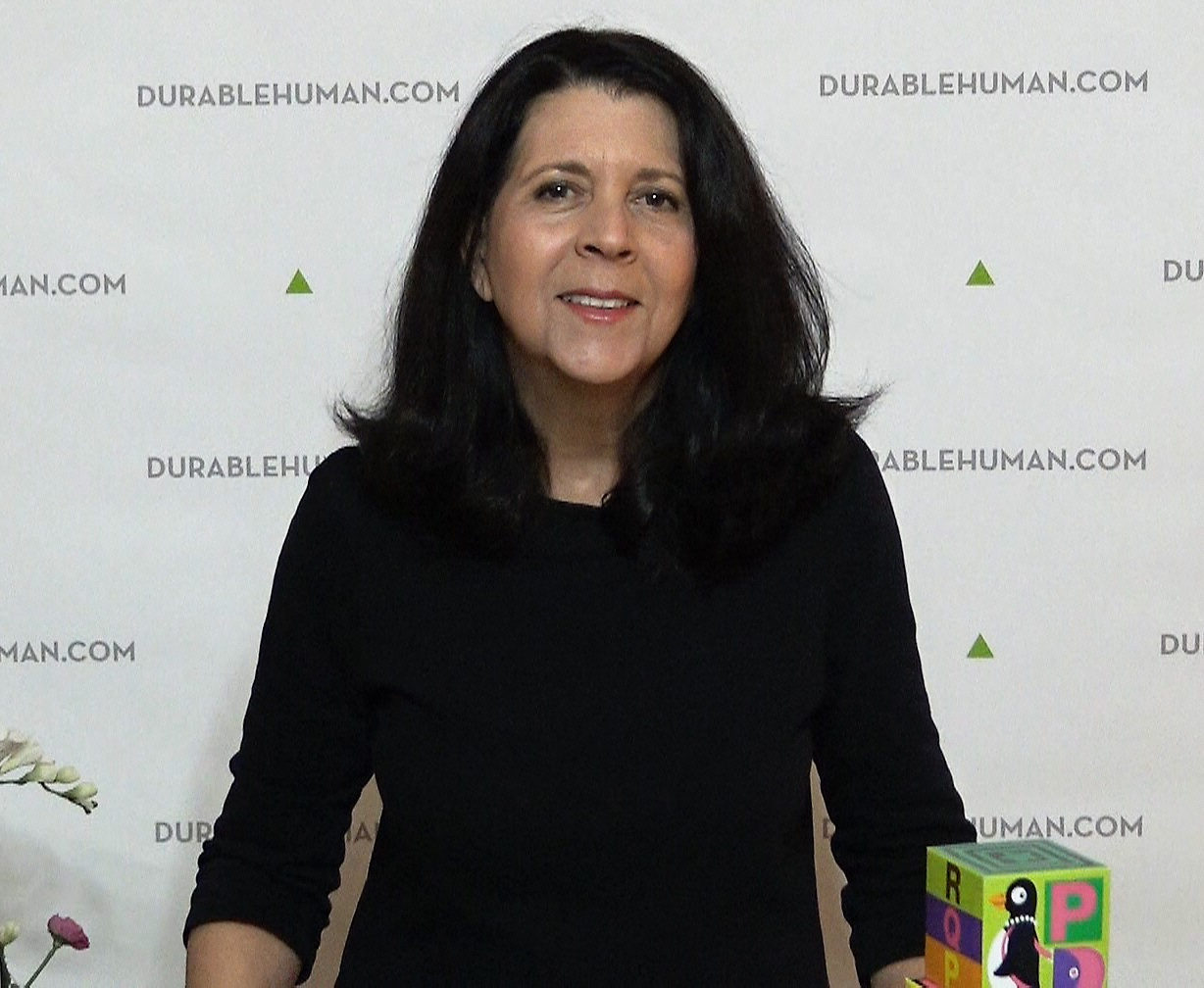
In Episode 71, I’m chatting with Jenifer Joy Madden about the latest research on brain development and ways we can help our children grow healthy and “durable” brains.
Jenifer Joy Madden is an award-winning health communicator, author, and educator. She founded DurableHuman.com to encourage all people to cherish and maximize the curiosity, creativity, compassion, and so much else they alone possess as human beings.
Big Ideas
- Jenifer defines durable as being “effective and strong in body, mind, and spirit for as long as possible.”

- The “Bushy Broccoli Brain” — Jenifer uses the Broccoli vs. Broccolini metaphor to show how the brain develops more interconnected, as synapsis fire from rich stimuli, whereas the broccolini is a stalky, more truncated structure, showing a lack of development. New research on the brain supports the idea that in order to be more durable, our children need 3D, multi-sensory, 360° experiences. The rich sensory environment at camp is a perfect example. Being outdoors and interacting socially stimulates the interconnections in the brain.
- If a kid is limited in their activity and they do one thing for a long period of time (such as playing a game online) it crowds out some of the other things they need to be doing during their day to promote full brain development.
- The brain develops over time so there are windows of opportunity throughout childhood to develop certain skills. Missing these windows can have detrimental effects, such as “Virtual Autism”. In France and Romania, doctors have identified “Virtual Autism” in kids under age four who have free reign all day to be on a tablet. After days and days of being on the screen, they stop responding to their names and adults can’t catch their eye. When kids return to a regular kid lifestyle and they’re playing with physical objects and playing outside, that “virtual autism” goes away.
- After a visit to a treatment center for internet addiction, Jenifer determined that one of the primary causes of this kind addiction is a lack of attachment. Attachment starts a little before birth that the child starts attaching to the primary caregiver — the mother. Kids who don’t securely attach to a caregiver become agitated and insecure and have trouble coping. We need to feed their love mechanisms early on in life, otherwise, they’ll be kind of shaky their whole lives. We need to make sure that babies’ first images are not obscured by a device.
- Jenifer describes her course for new parents called New Parent’s Confidence Kickstart.
- Recommendations for parents to help kids overcome addiction to their devices:
- Give them chores. They must have a purpose and be responsible contributors to the household. Physical activity is key.
- Help them develop skills, genuine relationships, curiosity (“The Triple Crown of Durability”.)
Quotes
Audrey: “There are all these basic needs that our kids have and to get this really bushy broccoli brain; a big part of it is the social connection. Talking face to face and making eye contact–all that great stuff–I think of that as making a bushier brain.”
Jenifer: “A lot of our functions are being taken over by robots and AI, so we have to do what we do best as human beings. That is to be thoughtful, curious, and skilled. We need to use the senses we have and they don’t. Compassion and intuition are special human functions.”
Jenifer: “Human beings that are young need to have that attachment. They need continuous eye contact with others and to have others listen to them.”
Audrey: “Giving kids chores is such a simple thing yet many people don’t realize just how important. We know that while kids are contributing and having a purpose in your home or at camp, they are also learning really important skills.”
Audrey: “When you think about kids growing up and their brains, whether it’s language development, or curiosity and those skills automatic it has all happened from practice. So you need that 3D experience that you describe for those neurons to fire together and create all that great, bushy, full brainpower.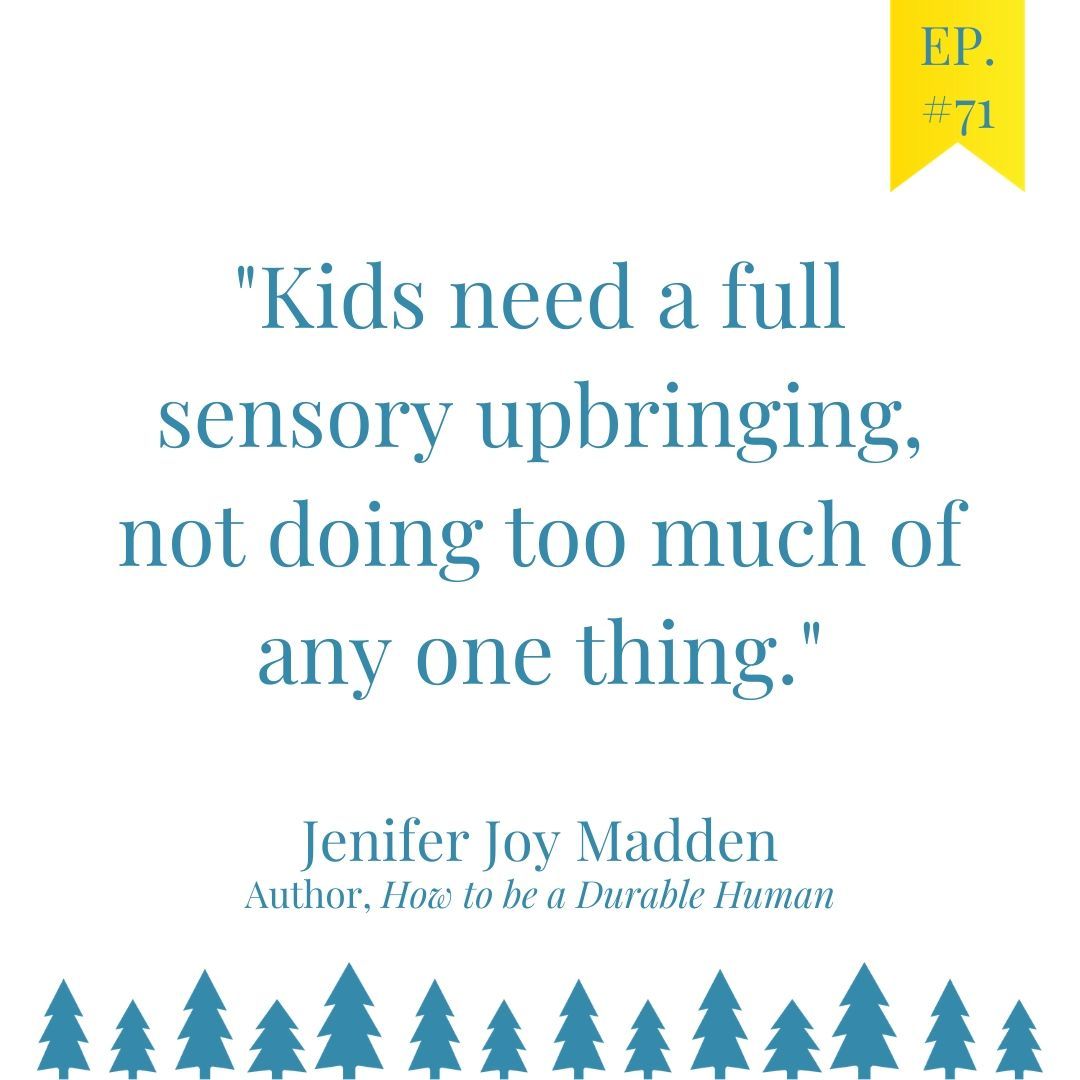
Jenifer: “I tell parents: Guilt be gone! Start to realize how attachment and developing boundaries around your technology can make a difference going forward.”
Audrey: “I think parents are so worried about what they’re doing wrong. No one is going to get everything right but you can make little course corrections along the way. If you’re noticing something with your family its never too late to do a reset. If you need to do more chores or have less screen time, those are all doable things. We all go through phases when we need to sometimes reset.”
Jenifer: “Numbers of autism diagnoses have skyrocketed in the last 25 years: 1 in 40 kids. The implication is that some of those kids have been affected by environmental factors. If can identify and at least try to mitigate them, we could at least see how the child responds. Having them not watch TV and removing them from screens is healthy for them so why not?”
Audrey: “Instead of focusing on what not to do, let’s think of things that we can do: going outside for an evening walk, going to the park, reading books together, playing cards or games. Try to find fun things to do instead of being on screens. That’s an easier way to introduce more time away from the screens that kids can get excited about.”
Jenifer: “You’ve got to slow down, keep your eyes open and keep observing your children so you don’t miss those vital cues from your kids.”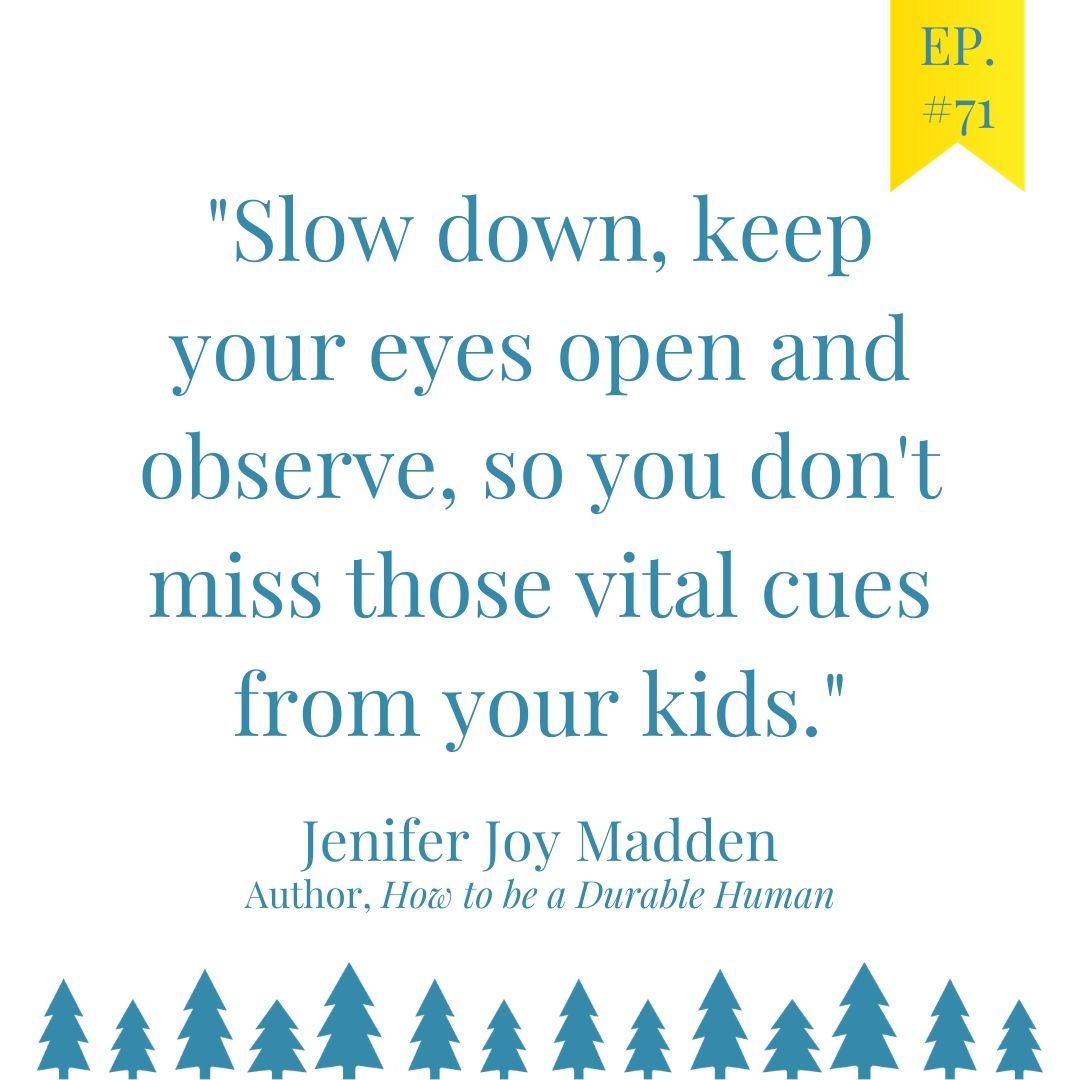
Resources
Get a discount for the Durable Human online course here!
American Academy of Pediatrics Family Media Plan/Media Time Calculator: https://www.healthychildren.org/English/media/Pages/default.aspx
http://durablehuman.com/fighting-tech-with-tech-online-tool-helps-families-reclaim-time/
Tina Payne Bryson and Daniel Seigel and their works The Whole Brain Child, No Drama Discipline and The Yes Brain.
Ted Talk, “Neurons That Fire Together Wire Together” by Dr. Joe Dispenza on YouTube.
The Big Disconnect: Protecting Childhood and Family Relationships in the Digital Age
Article on virtual autism study in France/Romania: https://www.psychologytoday.com/blog/the-fallible-mind/201706/there-is-new-link-between-screen-time-and-autism
Reset your Child’s Brain by Victoria Dunckley
New Parent’s Confidence Kickstart
Tech management resources (scroll down the page)
Durable Human post on Virtual Autism
VIDEOS:
TEDx “Durable Humans are Smarter Than Their Phones
TEDx/Broccoli combo explainer: (1 min)
“Lead a balanced life” Broccoli video
Baby Broccoli and Parent video
Related Posts and Podcasts
If you liked this episode, listen to episode 30, my interview with Jennifer on her book How to Be a Durable Human.
Why We Need to Unplug to Connect with our Families


